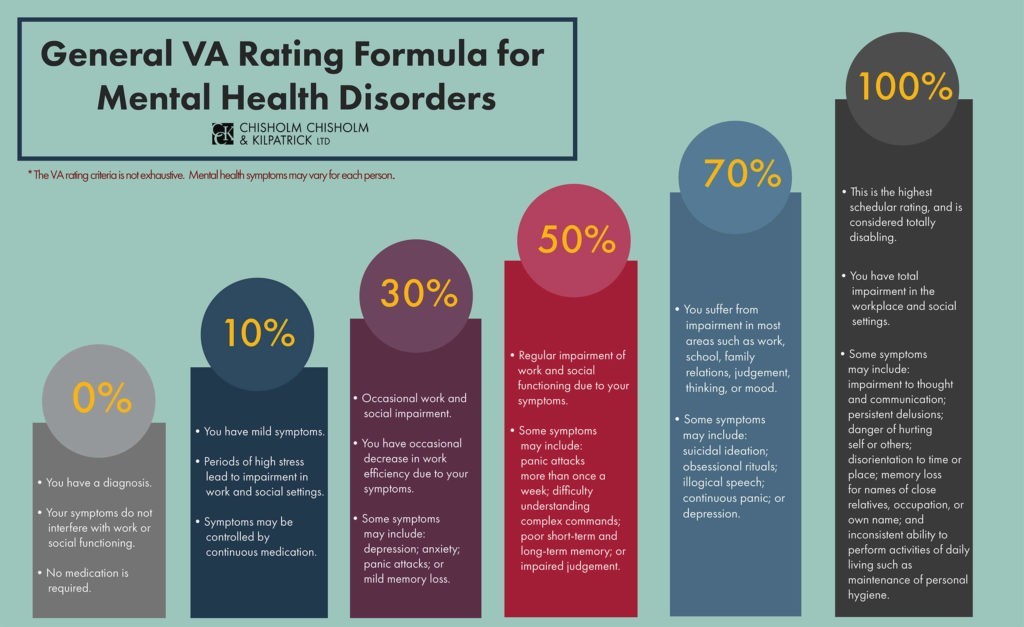VA Disability Ratings for Depression

CCK Law: Our Vital Role in Veterans Law
VA rates mental health conditions differently than physical ailments, and not all psychiatric disorders qualify for service-connected compensation. Eligible mental health conditions include mood disorders such as depression. Veterans suffering from depression may be eligible for VA disability benefits if they can demonstrate that their depression is due to their military service. This can often be done in a number of ways.
What is Depression?
Depression is a serious mental health condition that affects the way a person thinks, feels, and acts. Symptoms of depression tend to vary amongst individuals; however, common symptoms include the following:
- Persistent feelings of sadness, worthlessness, and hopelessness
- Lack of motivation or interest in activities that usually derive pleasure
- Difficulty sleeping and concentrating
- Change in appetite resulting in weight loss or weight gain
- Irritability
- Fatigue
Direct Service Connection for Depression
In order to establish service connection for depression on a direct basis, veterans must show evidence of the following:
- A current diagnosis of depression. The easiest way to show proof of a diagnosis for depression is through medical records. It is important to note that the diagnosis must be current in order to qualify for VA disability benefits.
- An in-service event. The best forms of evidence to prove an in-service event include service treatment records as they will have documented any injury or illness, including depression, for which you were treated while on active duty. This is very beneficial in proving a condition arose during service or shortly after service. Unfortunately, not all veterans have this type of evidence available to them. In this case, lay statements from the veteran and/or his or her family members can be particularly effective. These statements can be used to describe both the onset and progression of the veteran’s depression, as well as how it relates to service.
- A medical nexus between the depression and the in-service event. A statement from a qualified healthcare professional affirming that they believe your condition was “at least as likely as not” caused by your military service can serve as a medical nexus.
Common In-Service Causes of Depression
It is important to note that the in-service event can include anything that is specific to the veteran’s military service, occurring in the line of duty, or something that is unrelated to military service, but happens while the veteran is on active duty. For example, if a veteran’s family member passes away while they are deployed and they begin to experience depression as a result, they could still receive service connection. Again, the in-service event does not have to be military-related. Instead, it can be any event that happens in the veteran’s life as long as they were on active duty at the time that it occurred.

Secondary Service Connection for Depression
Veterans can also receive service-connected compensation for depression on a secondary basis if their depression is the result of another service-connected condition. For example, veterans with orthopedic conditions may become depressed due to the constant pain they experience or their functional limitations that prevent them from doing everything they used to do. In cases of secondary service connection, the nexus between a veteran’s primary service-connected disability and his or her depression must be clearly established. Therefore, to establish secondary service connection for depression, veterans must demonstrate the following:
- A current diagnosis of depression
- Medical evidence showing the relationship between his or her service-connected disability and his or her depression
Importantly, secondary service connection can also apply to a situation in which the veteran’s depression causes another condition. For example, many psychotropic medications that are prescribed to treat depression can result in significant weight gain. Such weight gain may then cause or aggravate orthopedic conditions. Here, the orthopedic condition may warrant secondary service connection. Therefore, secondary service connection works both ways insofar as a pre-existing injury might cause depression, or the depression itself can lead to a new condition.
Service Connection by Aggravation
Service connection for aggravation may be awarded when a veteran’s depression is worsened by military service. For example, a veteran may have suffered from depression prior to entering service, but then certain events in service caused his or her depression to worsen. Establishing service connection based on the theory of aggravation often requires a medical opinion from a qualified health professional stating it is at least as likely as not the veteran’s depression worsened as a result of his or her service.
Depression Prior to Military Service
If a veteran experienced depression prior to their military service, they may still be eligible for service connection; however, they must prove to VA that their depression was aggravated by, or worsened as a result of, their military service.
C&P Examinations for Depression
When processing claims for service connection, VA will often schedule veterans for a Compensation & Pension (C&P) examination through a VA Medical Center or private facility. During a C&P examination for depression, veterans will typically talk to a licensed psychologist or psychiatrist about the symptoms they are experiencing in order to establish the severity of the condition. The examiner will compile their findings and submit them to VA.
Veterans can obtain a copy of their C&P exam by requesting it from their local Regional Office. It is important to note that VA will not automatically provide veterans with copies of their exams. Therefore, it is necessary that veterans follow up on their own accord. Veterans can also have their representatives access a copy of the examination through VA’s electronic database system (i.e. VBMS).
If veterans receive an unfavorable C&P examination, they have the option to submit evidence to counter such findings. Such evidence may include medical evidence, lay evidence, and overall arguments. Specifically, veterans may obtain a private medical opinion assessing the etiology and/or severity of their depression. Additionally, veterans can submit lay statements outlining the onset and progression of their psychiatric symptoms along with an argument explaining why the C&P examination was inadequate.
Submitting Evidence Under Appeals Modernization Act (AMA)
While veterans have the right to submit evidence in favor of their claims for depression, it is important to note that there are several changes regarding evidence submission under the new appeals system (i.e. AMA). Under the Appeals Modernization Act, veterans will choose one of three review options when appealing an unfavorable decision from VA:
- Higher-level review;
- Supplemental claim; or
- Notice of Disagreement (i.e. appeal to the Board of Veterans’ Appeals).
When choosing the higher-level review option, veterans cannot submit additional evidence. In the supplemental claim lane, veterans can submit evidence as long as it is considered to be new and relevant. Within the Notice of Disagreement lane there are an additional three dockets for veterans to choose from
- Direct docket;
- Evidence docket;
- Hearing docket
Similar to the higher-level review lane, veterans are unable to submit evidence when choosing the direct docket. However, veterans do have the option to submit evidence in both the evidence and hearing dockets. In the evidence docket, veterans can submit evidence within 90 days from when the Notice of Disagreement was filed. Veterans who select the hearing docket can submit evidence at the time of the hearing or up until 90 days after.
How Does VA Rate Depression?
Mental health conditions are rated at 0, 10, 30, 50, 70, and 100 percent using VA’s General Rating Formula for Mental Disorders. These ratings are based on the level of social and occupational impairment a veteran experiences, and the severity of symptoms VA uses to characterize that impairment. For example, a veteran experiencing mild symptoms, or whose symptoms are well controlled by continuous medication, may receive a 10 percent disability rating for depression. Veterans with more severe symptoms such as persistent delusions or hallucinations in which he or she hears voices or perceives things that are not actually there, may receive a 100 percent disability rating. Self-injurious behaviors and suicide attempts are also consistent with a 100 percent rating.
Importantly, a veteran does not need to endorse all of the symptoms listed in each rating criteria. A Court of Appeals for Veterans Claims case, Mauerhan v. Principi, established that the symptoms listed in Diagnostic Code 9411 (i.e. post-traumatic stress disorder) are not intended to constitute an exhaustive list, but rather serve as examples of the type and degree of the symptoms, or their effects, that would justify a particular rating. The same case law applies when determining a disability rating for depression. Therefore, a veteran can have any number of the symptoms listed in the rating criteria for depression and still meet that level of evaluation.
Hospitalization and Temporary Total Ratings
If a veteran is hospitalized for 21 days or more due to their depression, they may be eligible to receive a temporary total rating of 100 percent. In order to qualify for a temporary hospitalization rating, veterans must be receiving treatment at a VA medical center or other VA-approved hospital. If a veteran is assigned a temporary hospitalization rating, their effective date will be that of when continuous hospitalization began. Benefits will continue until the last day of the month in which the veteran stopped receiving treatment for their service-connected conditions.
According to 38 CFR § 4.29, if a veteran is hospitalized for more than six months, their “claims folder will be referred to the rating activity for consideration of a schedular 100 percent rating”.
Total Disability based on Individual Unemployability (TDIU) for Depression
If a veteran is unable to secure and maintain substantially gainful employment as a result of their service-connected depression, they may be entitled to total disability based on individual unemployability (TDIU). VA should consider entitlement to TDIU benefits when evaluating the veteran’s claim for depression; however, veterans can also file for TDIU explicitly either as its own claim or as part of an increased rating claim.
Questions About VA Disability Ratings for Depression? Call Chisholm Chisholm & Kilpatrick LTD Today
If you are suffering from depression as a result of your military service, Chisholm Chisholm & Kilpatrick LTD may be able to help you get the VA disability benefits to which you are rightfully entitled. For a free case evaluation, call 401-753-6359 today.
About the Author
Share this Post

